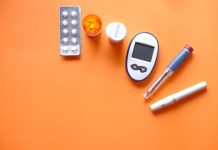Managing diabetes involves making conscious decisions about what goes into your body. This article will educate you about the common medications you should avoid as a type 2 diabetes patient.
When you have type 2 diabetes, keeping your blood sugar under check is key to staying and living healthy. However, apart from your lifestyle, the medications you take affect your blood sugar level.
Type 2 diabetes often coexists with other health conditions such as hypertension and heart diseases. Because of this, there is a possibility that medications used to treat these conditions will affect your blood sugar control. This article will examine the medications that can affect blood sugar that you should avoid as a type 2 diabetes patient.
Table of Contents
Drugs That Spikes Up Your Blood Sugar
Some drugs used to treat other conditions may increase your blood sugar. They may interact with your blood-sugar-lowering drugs to reduce their effects. It would be best to ask your doctor for a go-ahead before taking any of the drugs listed below.
1. Corticosteroids
Corticosteroids are drugs used to treat inflammatory conditions such as asthma, arthritis, and allergies. Examples of these drugs include prednisone, prednisolone, and hydrocortisone. They make the liver resistant to insulin, therefore trapping glucose in the blood.
If corticosteroids are to be used for a short period or used topically, such as on your skin or as inhalers, then they are not much of an issue. However, if your steroids are pills for long-term usage, you should talk to your doctor to adjust your diabetes medications as necessary.
2. Decongestants
Decongestants are used for common colds and flu. Many contain pseudoephedrine and phenylephrine—which can increase your blood sugar level. Using them for the short term is fine, but you should ask your doctor first to be sure.
The American Diabetes Association has recommended that type 2 diabetes patients take a flu shot yearly. Following this directive will reduce your need for decongestants significantly.
3. Niacin
Niacin, a drug for lowering cholesterol levels, can also increase blood sugar by causing insulin resistance. However, because many type 2 diabetes patients also have valvular heart diseases, you may need them.
In addition, a study has shown that using Niacin is a risk factor for new-onset diabetes. Therefore, you may need to readjust your anti-diabetes drugs if you invariably need to use one.
4. Beta-blockers and Thiazide Diuretics
Drugs such as beta-blockers and thiazide diuretics are used to lower blood pressure and treat irregular heartbeats. They also affect blood sugar levels. There are alternatives for diabetes patients, like the ACE inhibitors. But, if you cannot avoid their use, you should inform your doctor before starting beta-blockers or thiazide diuretics.
5. Cough Syrups
Many cough syrup contains high amounts of sugar, which are not good for your blood sugar control. Check the labels properly before buying one. Ensure you get the sugar-free versions.
6. Statins
Patients with heart disease use these drugs to lower their cholesterol levels. Many type 2 diabetes patients have an increased risk of having heart diseases. They are therefore often prescribed Statins which also increase blood sugar. Statins cause a decrease in insulin secretion and reduce the uptake of sugar by cells.
A study published by The BMJ Open Diabetes Research and Care journal showed a higher risk for prediabetes patients taking statins to develop full-blown type 2 diabetes. If taking them is necessary, you should see your doctor on how to proceed.
7. Antipsychotics
Antipsychotics such as haloperidol and olanzapine also raise blood sugar. These drugs treat anxiety, depression, schizophrenia, and other mental disorders. However, these drugs have been reported to cause an increase in blood sugar levels by increasing insulin resistance.
They pose a significant challenge because they are used for months to years by the patient. In situations where usage cannot be avoided, inform your doctors of the need for adjustments in your drug dosage.
8. Some Antibiotics
Certain antibiotics like fluoroquinolones used to treat urinary tract infections have been found to alter blood sugar levels. This is corroborated by a study published by the Clinical Infectious Diseases journal.
9. Oral Contraceptives
These birth control pills are also used to treat PCOS, a co-morbid condition in most patients with diabetes. However, they increase blood sugar levels by increasing insulin resistance.
Because PCOS and type 2 diabetes are connected, there may be an invariable need to take them. You should talk with your doctors if taking them is unavoidable.
10. Nicotine and Caffeine
You should avoid cigars, cigarettes, and nicotine patches as a type 2 diabetes patient. It would help to reduce your coffee intake as it contains caffeine. These chemicals cause a rise in blood sugar and complicate your blood sugar control.
Drugs That Lower Your Blood Sugar
As a type 2 diabetes patient, you may need to take some blood-sugar-lowering drugs called anti-diabetics. Other drugs not intended to treat your diabetes may also reduce your blood sugar level. Taking these drugs together with your diabetic drugs may cause you to become hypoglycemic due to their synergistic effect.
Below are lists of drugs you should avoid taking with your anti-diabetic drugs to prevent hypoglycemia.
- Excess alcohol intake
- Excess salicylates such as aspirin— used to treat fever and pain.
- Large doses of acetaminophen (paracetamol)
- Antibiotics such as Bactrim or Septra.
- Antimalarials such as quinine.
However, just because these medications can affect your blood sugar doesn’t mean you won’t use them. You should take note and plan with your doctor on the best approach. You should also be mindful of your blood sugar level before and after taking these drugs. You can use blood glucose charting features built into our Klinio app.
To Recap
Managing type 2 diabetes can be quite difficult. You will often wonder what you are doing wrong despite taking your medications appropriately and modifying your lifestyle. One of the problems lies with the medications you use for other conditions. Knowing and avoiding the drugs that affect your blood sugar will help you achieve good glycemic control.




